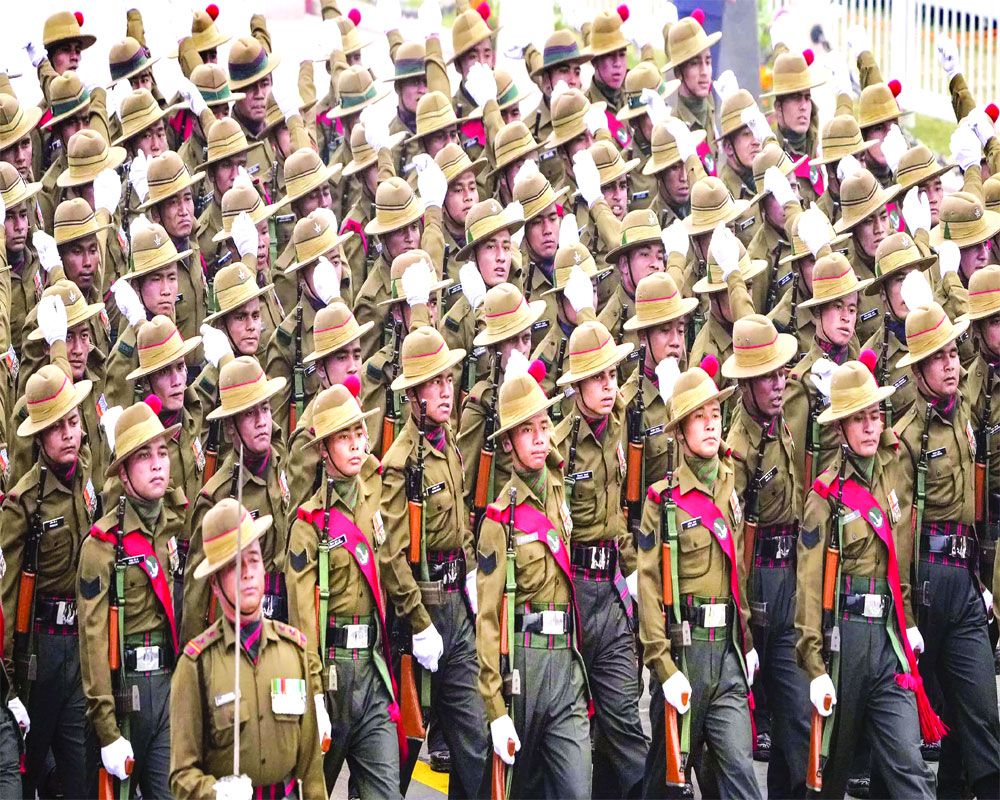Agniveer is pushing away Nepal’s Gorkhas. They are joining armies around the world; if we don’t wake up they might well be joining the Chinese army
Recently, I met a retired three-star General from the Gorkha Regiment. He told me that when he visited different formations the Divisional and Corps Commanders told him that the best battalions in his formation are from the Gorkhas. Whether it is battle, counter insurgency, professional competitions or any other mission, Gorkhas stand out. When Nepal agreed that India inherit the British legacy of recruiting Gorkhas at Partition in 1947, it was the first time that Gorkhas were to be officered by Indians. Prime Minister Nehru, speaking to the Constituent Assembly, thanked Nepal for it.
The British coveted their 51 Gorkha battalions at the height of World War II so ferociously that only Brits were allowed to command them. Only Indian medical officers were attached to some of the Gorkha battalions. When they were being downsized after the transfer of power from Hong Kong to China in 1997, a country-wide ‘Save The Gorkha’ movement started across Britain. Many pubs and restaurants are named after Gorkhas as well as iconic places in Nepal.
No such movement has started in India over the possible phase-out of the Gorkha Brigade, the Army’s single-biggest regiment of 43 battalions larger than the entire British Infantry, as its roots are in politics, not in high diplomacy and strategy. This is happening when the big gun in the armed forces, Chief of Defence Staff, Gen Anil Chauhan belongs to the 11 Gorkha Regiment. A similar contingency was nipped in the bud in 1973 by then Army Chief Gen Gopal Bewoor also from 11 Gorkhas who thought the idea of sufficient recruitable material in India was unstrategic. The Gorkha Brigade is a strategic force permitted to be recruited by Nepal that characterizes the special relations between two sovereign countries.
The run-down of the Gorkha Brigade began with three years of no recruitment of Nepal Domiciled Gorkhas (NDG) and retirement of 4000 Gorkhas creating a deficiency of approximately 8000 to 9000 personnel. This is to be made good by recruiting Indian Domiciled Gorkhas (IDG), Kumaonis, Garhwalis and tribals of the northeast without a single NDG. Despite reducing their recruitment standards, IDG just about manage to fill their quota of 40 per cent intake. Kumaonis and Garhwalis have their single-class regiments and will be unable to provide suitable material for long. Assuming Nepal will be unwilling to permit recruitment under Agniveer norms, by 2030 only half or less of Gorkha battalions will be ‘Gorkhali’. By 2025, some of the seven Gorkha regiments will have to shed one battalion from their five or six battalions. At some stage, around 2035, or even earlier, the government may order winding down the Gorkha Brigade creating a slack of 30,000 soldiers.
India did not consider it necessary or wise to consult Nepal on Agniveer. Instead, it delivered a fait accompli with a neighbour it claims it has the closest relationship in the neighbourhood. Nepal was the second country after Bhutan Mr Modi visited when he became Prime Minister in 2014. Not just that, he captured the heart and soul of Nepalis with his oratory in their Parliament when he extolled the courage and bravery of Gorkha soldiers who had shed their blood defending the territorial integrity of India. Ambassadors in Kathmandu since 1959 whom I met were enamoured with Gorkhas but some doubted their loyalty to India. One Ambassador never visited Gorkha hubs in Nepal like Pokhara and Dharan to meet the ex-servicemen. But since the last decade and more after the end of the Maoist insurgency, Ambassadors without exception had expressed no doubt about Gorkha's loyalty and even admitted that they were a pro-India constituency in Nepal. During the Maoist insurgency, Maoists sought, through inducement and coercion, Indian ex-servicemen and instructors to train their cadres. Only one ex-serviceman from 1.25 lakh ESM joined them. Kathmandu deserved to be consulted over a sensitive strategic bilateral issue such as recruitment, especially when the rules of engagement were significantly altered for the first time in 77 years even though the tripartite agreement (1947) does not mention consultation. Still, it does seek ‘equal treatment with the parent army’. There are several ‘mechanisms’ to initiate discussion on defence and security most notably the Bilateral Group on Security Cooperation India and Nepal established during the Maoist insurgency. Kathmandu was between elections when Agniveer was announced and Prime Minister Sher Bahadur Deuba, was heading the government. There was a short discussion on Agniveer in Nepal Parliament where it was criticised by former Defence Minister Bhim Rawal.
Due to the unstable nature of the present government led by Prime Minister Pushpa Kamal Dahal Prachanda, and neither side taking up Agniveer formally during his visit in May, it is on the backburner. Foreign Minister Narayan Prakash Saud told BBC Nepali in Kathmandu recently that Nepal will seek a national consensus on Agniveer which is virtually putting it in cold storage. In other words, Agniveer is unacceptable to Nepal in its present form. Slamming Agniveer, Nepal’s hardy Gorkhas are now joining the Russian Army while continuing with the British Army, Singapore Police Brunei Army and French Foreign Legion. At this rate, the Chinese dream of recruiting Gorkhas may bear fruit.
(The writer, a retired Major General, was Commander, IPKF South, Sri Lanka, and founder member of the Defence Planning Staff, currently the Integrated Defence Staff. The views expressed are personal)


























